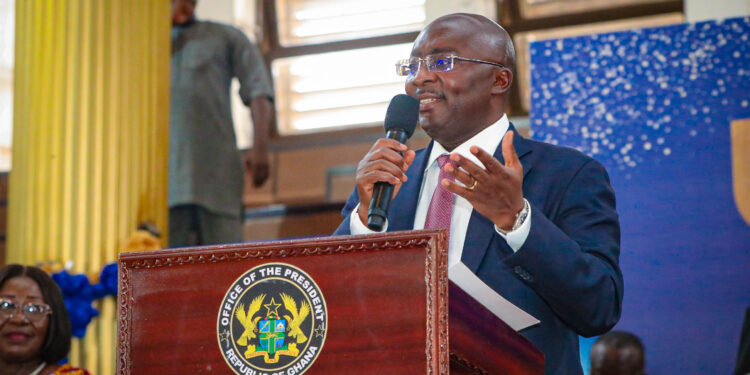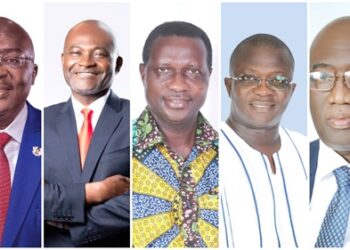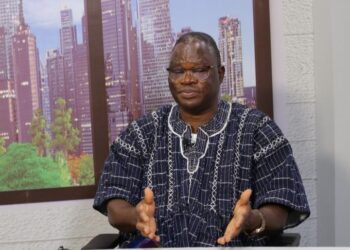During his first major policy address as flagbearer of the New Patriotic Party (NPP) on Wednesday, February 7, 2024, in Accra, Ghana’s Vice President, Dr. Mahamudu Bawumia, unveiled approaches to address the nation’s problems if he is elected as President.
He identified agriculture, energy, housing, sports, and public transportation as key areas impacting development and outlined potential solutions for each.
“A major priority of my government will be to reduce the cost of living,” Dr. Bawumia declared.
“The cost of living in the world has increased massively following the COVID pandemic and the Russia-Ukraine war. Global inflation increased from 1.55% in 2016 to 8.27% at the end of 2022, a five-fold increase!. In particular, the increase in the cost of living has been driven by increases in food prices, energy prices, housing (rents), and transport prices. Any attempt to reduce the cost of living on a sustainable basis must therefore tackle agriculture, energy, housing, and transport prices, and that is what I am going to do.”
Emphasis on agricultural modernization
To ensure food security and enhance yields, the New Patriotic Party flagbearer spoke about the need for modernizing Ghana’s agricultural sector. Bawumia’s proposed solutions if elected president include implementing precision agriculture practices, improving soil fertility, and constructing the Pwalugu Dam through public-private partnerships.
“I want a Ghana where we attain food security through the application of technology and irrigation to commercial large-scale farming,” he said.
“We will also promote the use of agricultural lime to reduce the acidity of our soils, enhance soil fertility, and get more yield from the application of fertilizers. Ghana has an abundance of limestone to do this. I will prioritise the construction of the Pwalugu Dam by using private sector financing to crowd-in grant financing.”
Reducing public transportation costs
To make public transportation more affordable, Bawumia proposed transitioning to electric vehicles (EVs). He claims this could reduce costs by 30–40% due to lower fuel and maintenance requirements for EVs, ultimately leading to stable and predictable fares.
“My administration will endeavour to reduce the cost of public transport by 30–40% with the adoption of electric vehicles for public transportation,” he noted.
“The public transport pricing formula is dominated by two key variables: the price of fuel and the price of spare parts. Electric vehicles do not use petrol or diesel, and spare parts are minimal. That is what will bring down the fares for EVs. More importantly, transport fares for EVs will be stable, and the constant and large increases in fares will become a thing of the past.”
Expanding access to affordable housing
The “Housing for All” initiative, a cornerstone of Dr. Bawumia’s housing policy, aims to partner with the private sector to develop large-scale housing projects, potentially reducing government borrowing. Additionally, he plans to expand the National Rental Assistance Scheme to address the issue of high rent advance demands.
“We will partner with the private sector to build large housing estates without the government having to borrow or spend. Also, the National Rental Assistance Scheme, which is working so well, will be enhanced to deal with the problem of demands for rent advances of two years and more,” he added.

Energy sector reform and renewable energy focus
For the energy sector, Dr. Bawumia pledged to achieve energy self-sufficiency at lower costs through increased reliance on solar and other renewable energy sources. His plan includes introducing 2,000 MW of solar power and diversifying the generation mix to reduce dependence on fossil fuels by the end of his first term. He also emphasizes the need for market efficiency and increased private sector participation in the energy sector.
“We will diversify the generation mix by introducing 2,000 MW of solar power and additional wind power through independent power producers to reduce our dependence on oil and gas by the end of my first term in office. This will significantly reduce the cost of electricity.’
“The fact that current residential, commercial, and industrial consumer’s power is still neither reliable nor cost-competitive is a testament that the regulatory and administrative measures so far implemented have not fully achieved the objectives we have set for ourselves in dealing with the legacy issues the government inherited.”
“Therefore, like the telecom market, we shall work to bring efficiency to markets and expand competition from more private sector participation in generation and retail.
“With reliable and cost-competitive power, we will attract more manufacturing capacity into the country, create more jobs, improve services, export more products, and support our AfCFTA strategy to improve the participation of Ghanaian industries in intra-African exports and trade.”
“To assist in the transition to green energy, there will be no import duty on solar energy.”
Potential economic and trade benefits
By implementing these proposals, Dr. Bawumia hopes to attract more manufacturing businesses, create jobs, improve services, and boost exports through the African Continental Free Trade Area (AfCFTA). He also announced the removal of import duties on solar energy to encourage the transition to renewable sources.
Sports development and funding

Dr. Bawumia highlighted the unrealized potential of Ghanaian sports, citing inadequate and unsustainable funding as a major obstacle.
“Sports is a multi-million dollar industry and a catalyst for youth development,” Dr. Bawumia said. “However, we have yet to realize our full sports potential, and we cannot achieve this with the same funding model we have relied on since independence.”
“My government will prioritize the creation of incentives for corporate sponsorship as a sustainable method of financing sports development and promotion for our national teams, including football, athletics, and boxing at all levels,” he stated.
“This approach will alleviate financial pressure on the government and enable the redirection of more support to other sports disciplines.”
Dr. Bawumia also announced plans to establish the School Sports Secretariat, an agency under the Ministry responsible for Sports, to promote grassroots sports through schools in collaboration with the Ghana Education Service and sports federations.
This initiative aims to redirect more funding to grassroots development by boosting the activities of various federations.
“My government, as part of a broad sports development vision, will establish the Ghana School Sports Secretariat, which will be an agency under the ministry responsible for sports, in collaboration with other stakeholders such as the GES and sports federations,” he said.
Dr. Bawumia added that as part of his vision to make Ghana a hub for emerging sports in Africa, his government will also seek school-level collaboration with international sports bodies like the NBA and NFL to make Ghana a hub for these emerging sports in Africa, to create more opportunities for young people.

“We have already tried this with the NFL, the governing body for American Football, which agreed to host in Ghana, in 2022, the first ever NFL Flag Football in Africa after my engagement with them. This paved the way for 10 young Ghanaians to be selected to the United States to represent Africa in a global NFL tournament last year.”
“Another set of young Ghanaians, who were picked after the 2nd NFL Africa Football was also held in Ghana last year, are currently in the United States to represent Africa.”

































